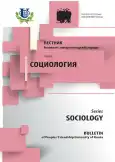№ 1 (2008)
- Жылы: 2008
- Мақалалар: 10
- URL: https://journal-vniispk.ru/2313-2272/issue/view/23105
ARTICLES
Professional education under globalization
Аннотация
The article is aimed to discuss the problems of professional education seen against new technologies and globalization. The author puts forward a hypothesis on five dominating international models of higher education under world economic globalization.
 5-15
5-15


Sociological interpretation and substantiationof the standards of higher technical education (based on the examplesof the republic kazakhstan)
Аннотация
The article presents the sociological interpretation and substantiation of the standards of Higher Technical education in the Republic Kazakhstan. We consider new achievements of the sociology of education, the strategy of industrial innovative development of the country and the requirement of globalization.
 16-24
16-24


Social value of complementary professional education
Аннотация
The article analyzes complementary professional education as it is today, considers the problems of social demand for such educational services in modern Russia. Besides, the author raises a number of disputable questions concerning the shift in the place and role of complementary professional education institutions in Russian educational system.
 25-30
25-30


 31-38
31-38


University Rating: Ideology and Methodology of «League Charts»(foreign practice)
Аннотация
The article represents the first part of analytical review of ideology, methodology and practice of working out university ratings. The author singles out basic approaches to the task, whose specificity is conditioned by differences in national educational systems and respective emphases in functional aims of ratings (part of professional accreditation of a university, factor of choice by applicants, and/or instrument of international competition).
 39-48
39-48


Interethnic Relations in the South Caucasus
Аннотация
The research analyzed in the article provides an insight into a level of ethnic tolerance in Armenia, Georgia and Azerbaijan. Stating the level of ethnic tolerance of aboriginal population in those countries towards each other and other ethnic groups, the authors single out a number of factors affecting it.
 49-62
49-62


Formation and Legal Regulation of Credit Unions
Аннотация
Credit unions are self-made organizations that aim to render financial assistance to people, enterprises and small businesses. Though they came into being in early 1990s and are essentially civil society institutions, credit unions are still facing certain difficulties due to the lack of norms (legal in the first place) that regulate their activities.
 63-73
63-73


Coomunication Culture in a company
Аннотация
The article substantiates the interconnections between the level of communicative culture in a company and the level of management, which shows the investment and financial attractiveness of the enterprise. The article reveals principles and methods of sociocommunicative technology, whose application positively affects the state of communicative culture of within a company. Application examples of these principles and methods in management of power grid companies in the Belgorod region are also given.
 74-79
74-79


 80-86
80-86


Alain Touraine's «Antisociology»
Аннотация
The article is dedicated to the works of A. Touraine, who was one of the critics of classical sociology. He formulated the principles of «antisociology» and created «sociology of action» which helped him describe future social status, known as «programmable society».
 87-95
87-95











